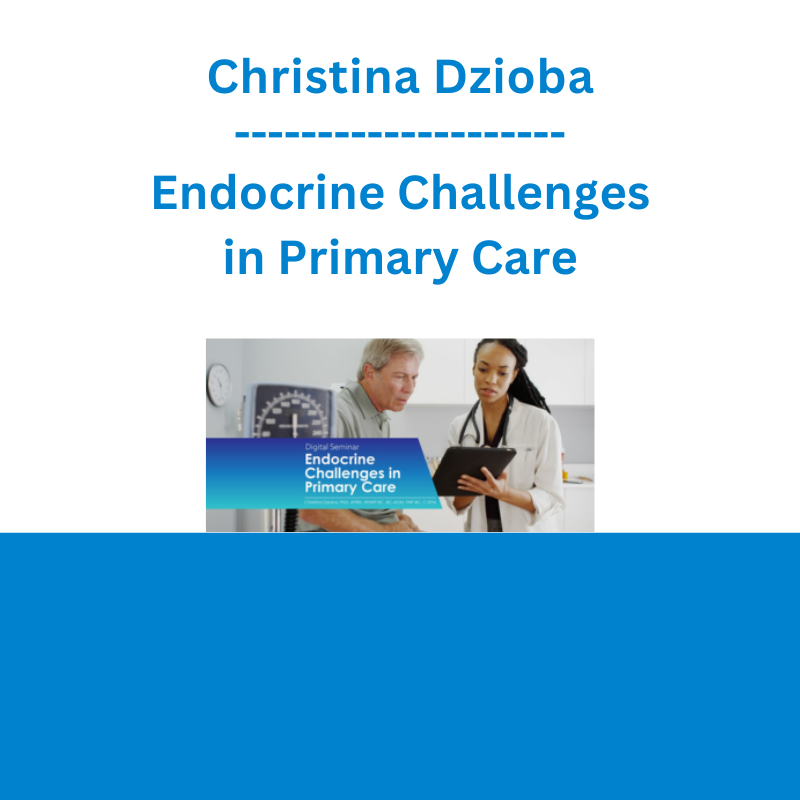*** Proof of Product ***
Exploring the Essential Features of “Christina Dzioba – Endocrine Challenges in Primary Care”
Endocrine Challenges in Primary Care
Speaker: Christina Dzioba, PhD, APRN, WHNP-BC, BC-ADM, FNP-BC, C-EFM
Duration: 2 Hours 21 Minutes
Format: Audio and Video
Description
Alterations in endocrine system function can be some of the most challenging issues primary care providers will manage in their practice. Many treatment options, both pharmacologic and non-pharmacologic, exist to treat and manage endocrine disorders. By relating the symptoms patients present with to the hormone regulation and feedback mechanisms providers will be able to individualize treatment options for their patients and currently manage or refer as indicated.
Speaker
Christina Dzioba, PhD, APRN, WHNP-BC, BC-ADM, FNP-BC, C-EFM
Christina Dzioba, PhD, APRN, WHNP-BC, BC-ADM, FNP-BC, C-EFM, is an assistant professor of nursing at Florida Gulf Coast University and has experience as an endocrine nurse practitioner at the Endocrine Institute of South Florida and Endocrine Specialist. She has a demonstrated history of working in the higher education industry and with complex chronic illness and hormones focusing on diabetes, thyroid, lipid management, menopause, metabolic syndromes and osteoporosis. Dr. Dzioba is skilled in nursing education, public speaking, pregnancy counseling and management, and program development.
Speaker Disclosures:
Financial: Dr. Christina Dzioba has employment relationships with Endocrine Institute of South Florida and Florida Gulf Coast University. She receives a speaking honorarium from PESI, Inc. She has no relevant financial relationships with ineligible organizations.
Non-financial: Dr. Christina Dzioba is a member of the American Academy of Nurse Practitioners , the Association of Diabetes Care and Education Specialists, the Christian Medical Dental Association, and the Florida Nurse Practitioner Network. She serves on the board of Nurse Practitioner Council of Collier County and the SWFL Free Pain Clinic. She has a family member with thyroid issues.
Objectives
- Differentiate between the symptomology, pathophysiology, identification, and management of endocrine disorders.
- Determine the top medications used for each endocrine disorder presented and when to use it.
- Propose when to refer to specialist care.
Outline
- Metabolic Syndromes and Diabetes
- Gut Health, genetics, and hormone dysregulation as key pathophysiology components
- Prevention and Lifestyle Medicine
- Treatments require a multifaceted approach and individualized plan
- Watching and Waiting leads to missed opportunities and weight gain
- Older adult considerations
- Thyroid disorders
- Gut health, Genetics, and hormone and immune system dysregulation lead to pathophysiologic changes
- Hyperthyroid and Hypothyroid symptoms and management
- Risk factors to consider in primary care
- Older adult recommendations
- Osteoporosis
- Quality is just as important as quantity and is not just a problem in older adults
- Key risk factors to consider
- Primary care partnerships needed to help patients through treatment
Target Audience
- Nurses
- Nurse Practitioner
- Physician Assistant
- Physicians
Please see the full list of alternative group-buy courses available here: https://lunacourse.com/shop/










 Team NFT Money - Ultimate NFT Playbook
Team NFT Money - Ultimate NFT Playbook  Forexmentor - Recurring Forex Patterns
Forexmentor - Recurring Forex Patterns